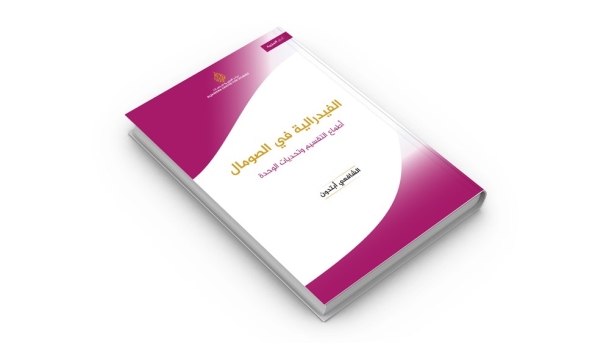
Al Jazeera Centre for Studies (AJCS) published a new book this month entitled Federalism in Somalia: Aspirations of Partition and Challenges to Unity by Shafei Abtidoon. It sheds light on the impact of federalism on Somalia's present and future and as an alternative for unity, rendering the book particularly valuable.
Federalism in Somalia consists of a theoretical introduction and three chapters addressing the background of Somalia's partition through the federal system. Abtidoon used various approaches to present his thesis, including:
1) The historical approach to portray and contextualise what has happened in recent decades
2) The analytical-descriptive approach to review the agendas, objectives and backgrounds of regional powers
3) The content analysis approach to examine the narratives that frame the different literature addressing this topic
The author begins with a theoretical introduction in which he addresses the concepts associated with federalism as well as the central and confederal state. He moves on to highlight the experience of federalism in Arab countries in situations similar to that of Somalia such as Yemen, Iraq and Sudan.
In the first chapter, “The Political System in Somalia: From the Fall of the State to Creative Chaos,” Abtidoon elaborates on the political situation in Somalia from 1943 to 1960 to provide a better understanding of the current political accumulations and highlight the short-term civilian governments that were followed by a two-decade rule by military regimes. This chapter also looks into the factors that led to the fall of the central state of Somalia in the early 1990s.
In the second chapter, “The Federal Project in Somalia: From the Legacy of Colonisers to Neighbours,” the author discusses the draft federal system in Somalia by exploring the role Western colonisation played in the disruption of the country as well as the roles of regional players (such as Ethiopia and Kenya) in imposing this system through conferences of reconciliation between Somali factions. The author questions whether federalism will solve Somalia's dilemma or mark the beginning of disintegration.
The third chapter, “The Federal Experience in Somalia: Opportunities and Challenges,” deals with a number of issues that – according to Abtidoon – undermine the likelihood a federal system will be implement in Somalia in light of the challenges of the tribal mosaic that is divided between the federal system on one hand and unity and centralisation on the other.
The author concludes the book by presenting a number of facts. He states that Somalia, as a nation with one ethnicity; one language and one religion, possesses the seeds of strength and the potential for unity. Factors of partition into fragile and weak entities, however, were and remain stronger than efforts for unity. According to the author, this is attributed to regional and international policies that seek to divide the country into federal states beyond the control of the federal government.
Abtidoon goes on to say that the administrative divisions seen by Somalia are caused by the political conditions as well as the tribal and political quotas. All of this will continue to hinder any chance for progress towards tangible political breakthrough on the ground. The author blames this on the wealth distribution system and the current tribal-based quotas and portfolios. He adds that this would subject the country's political action to the tribe's political power, which takes control of the state's influence and funds and undermines the modernisation project in Somalia.
Elaborating on the future of Somalia, the author predicts the political divide will continue, attributes this to the administrative regimes which he describes as lacking a consolidated political vision. Each regional administration seeks to secure its own political and economic interests, thus igniting an ongoing political conflict between the federal government and its states.
Furthermore, Abtidoon concludes that the persistence of the security crisis in the country opens the door for foreign intervention by regional and international players under the pretext of reducing the impact of security chaos in the Horn of Africa. He argues that this will whet the appetite of other countries to seize the wealth of Somalia.
He stresses that the failure to draft Somalia's interim constitution, the non-activation of the judicial system and the absence of the Constitutional Court will sever political relations between various Somali actors, especially the heads of federal states and the Somali federal government.
Then, the author explains how the dominant tribal system will not serve the interests of Somalia's modern state, arguing that the current tribes always look for suspicious political roles. Such tribal policies will only feed the social divide and do not contribute to the building of an institutional state.
In addition, he points out that the emergence of Salafist militant groups, such as the Mujahideen Youth Movement (Al-Shabaab), has fed the neighbouring countries' convictions that Somalia is plagued with security risks that may possibly extend to them. Under this pretext, those countries kept their armies in Somalia in an attempt to weaken the state before dividing it according to the interests of the rapacious regional countries.
On the rampant corruption and nepotism in official institutions, Abtidoon states that this condition has undermined the country’s prestige in the eyes and minds of its people and aborted their hopes and aspirations for recovery. He warned that the deteriorating economic situation and the political regime's reliance on international and Arab aid to pay the salaries of soldiers and employees would threaten the independence of the political decision, which will definitely affect the political future of Somalia.
Finally, the author stresses the need to rebuild the Somali army. He also warns that the persistence of the security crisis and the regional and international interventions will turn Somalia into a fragile country that is incapable of confronting its enemies and those seeking to appropriate its resources.
About the Book
Title: Federalism in Somalia: Aspirations of Partition and Challenges to Unity
Author: Shafei Abtidoon
Publisher: Al Jazeera Centre for Studies and Arab Scientific Publishers
Year: 2018